» I recently purchased a paperback .. at the used book store tucked just-inside the Newport Beach Public Library (.. sitting there to your right as you enter the cavern of cool air).
 This wonderfully cramped shop sells many of the titles generously donated by Newport's community of wealthy seaside readers.
This wonderfully cramped shop sells many of the titles generously donated by Newport's community of wealthy seaside readers.
[ Run by some of the most helpful grannies you've ever met. "Let me see if we have that title in the back room." ]
The fluorescent orange sticker affixed to the cover of my copy says I paid » $1.00. A buck. Not bad, considering that Amazon wants $12.
[ I also nabbed Walter's bio on Einstein there, a hardback for only $3 .. a deal that seemed too good to be true. ]
This orange-stickered paperback, for which I paid one dollar, contains NOTHING BUT quotes from Hemingway [1899-1961] .. about the art and craft of » writing ..
.. organized into 13 different categories (chapters), such as » What to Write About (chapter 4).
My favorite is » chapter 11. No, I'm not talking about bankruptcy. Chapter 11 is where Hemingway talks about » Other Writers ..
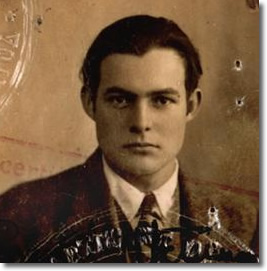 .. where he says things like » "Tolstoy is a prophet" .. [ Hemingway was age 11 when Tolstoy died. ]
.. where he says things like » "Tolstoy is a prophet" .. [ Hemingway was age 11 when Tolstoy died. ]
.. and » "Dostoevsky was MADE by being sent to Siberia. Writers are forged in injustice, as a sword is forged." [ Green Hills of Africa, p 71, 1935 ]
And you know how I am a 'quotes' man .. especially insightful quotes from writers and other artists.
A guy named Larry Phillips apparently combed thru all of Hemingway's novels and extracted the passages that pertain to writing itself. An impressive undertaking, no?
The back-cover of Larry's book says » "Ernest Hemingway did more to change the style of English prose than any other writer in the twentieth CENTURY."
Hemingway won the Pulitzer in '53 for Old Man and the Sea and the Nobel Prize for Literature in '54. Larry's book (pub 1984) begins with the following short preface »
Throughout Hemingway's career, he maintained that it was bad luck to talk about writing ..
.. that it takes off "whatever butterflies have on their wings and the arrangement of hawk's feathers if you show it or TALK ABOUT it."
"Say what?" Does that not strike you as odd? As ironic? That the man who did more to change the style of English prose .. claims that it is bad luck to TALK ABOUT writing.
Yet here we have an ENTIRE BOOK .. with NOTHING BUT. One hundred and fifty pages worth .. of not-talking about writing.
And what, pray-tell, Ernest, is all this mumbo-jumbo about butterflies and hawk's wings? There is NOTHING, good sir, to be found on butterflies' wings.
[ Yes, I checked. Absolutely nothing. But the hawks are simply too fast. Much too fast for me to examine the arrangement of their wings in any detail. ]
The man who declared » "Write hard and clear about what hurts" .. is now suddenly tiptoeing by the butterflies? "Come on, Hem. What gives?"
 » Hemingway's Lean, Tight, Muscular Prose
» Hemingway's Lean, Tight, Muscular Prose
This might be a good place to mention .. that the #1 way in which I feel as tho I relate to Hemingway-as-a-writer .. is that my life has a way of working itself into my writing.
But that is precisely the thing that I like about Hemingway.
Hemingway feels like he takes you home with him. (Because he does.) "Papa," is what they call him. An affectionate term.
My understanding of Hemingway's writing [.. a topic of much Nobel-grade discussion ] goes something like this » he creates a structure (story) using artistic 'sticks' (for lack of a better word).
When the (artistic) structure is finally done/complete, he returns to remove every stick that can be safely removed .. without the structure collapsing.
» Hemingway says » My Prose Mimics Cézanne's Paintings
Cézanne was doing a similar thing with paint a few decades earlier. Hemingway claims that he got his writing mojo from Cézanne (.. who died when Hemingway was only 6 or 7).
So he means that he got it from studying Cézanne's art, his paintings (.. while he was living in Paris in the early twenties).
Hemingway was trying (he claims) to translate [ somehow. is it even possible? too much absinthe? ] Cézanne's artistic technique into literature.
••• today's entry continues here below •••
But I imagine that Hemingway looked at these paintings [ visual art is great inspiration for the writer .. because writing is all about manipulating images, no? ] ..
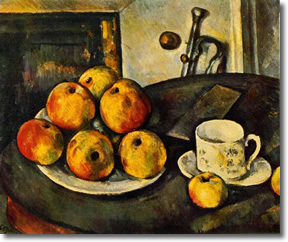 .. and Hemingway said, "There is something here that I like about these paintings ..
.. and Hemingway said, "There is something here that I like about these paintings ..
.. but I am not quite sure what it is." Because it EXISTS ONLY IN the MIND.
Cézanne saw that .. if you leave out certain parts » your brain/mind will fill in the 'missing' part(s).
And that is what makes his paintings seem even cooler .. than they actually / really are.
But it's a subtle thing .. which goes easily unnoticed .. the result of which is » the reader becomes MORE INVOLVED in a Hemingway novel .. because you-yourself are (somehow) helping to create the story.
» The (Easily Unnoticed) Cézanne Effect
Easily unnoticed, but big effect. Since the mind can become so rigid .. in its thinking .. that when you finally 'wake up,' [ .. or so I hear ] you say » "Oh my God, people are so screwed .. that we gotta TRICK them .. into seeing the truth."
Compared to the old-School Cézanne, artists here in the 21st century .. when they can .. INSERT little snippets into these voids that the Cézanne-technique removes. That is why you feel smarter even when you're just looking.
I am merely speculating here .. but most would agree that Hemingway's novels are certainly engaging. Notice that The Sun Also Rises (a title he got from the Bible) is still selling strongly at Amazon (.. ranked at #405 right now, among ALL BOOKS, both old and new).
The Old Man and the Sea is ranked #632. By contrast, Walter's bio on Einstein is ranked » #5,815, which is still very good, for a 5-year old title, and one of the most outstanding books I know of. Yes, these rankings fluctuate with sales, but The Sun Also Rises was published nearly 90 years ago.
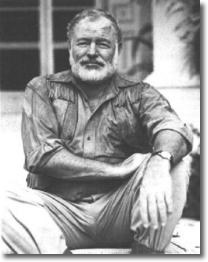 And even Hemingway said <rad_paraphrase>, "Yeah, my creative writing mojo comes from Cézanne, sure, but I'm not gonna tell YOU about it." </paraphrase> Cuz he really doesn't understand how it works himself.
And even Hemingway said <rad_paraphrase>, "Yeah, my creative writing mojo comes from Cézanne, sure, but I'm not gonna tell YOU about it." </paraphrase> Cuz he really doesn't understand how it works himself.
In other words, he was going on gut-instinct (intuition) .. and exploring .. in that general direction.
Cuz that is the reputation that comes with Hemingway .. that » if you remove a single word .. the whole novel comes crashing down.
Seán Hemingway (Ernest's grandson) puts it thusly [ .. as recorded onto the Introduction of the Restored Edition of Moveable Feast [ pub 2009 ] ..
.. while the memoir was originally published in 1964, 3 years after Hemingway's death ..
.. yet it was written ABOUT [ wistfully ] his early days as an American expatriate living in Paris after the Great War, and during the Roaring Twenties, made famous and immortalized by his friend F Scott Fitzgerald ] ..
.. when grandson Seán says (in his OWN VOICE, on the excellent audio book) » "When complete, his writing is SO TIGHT that each word is integral .. like notes in a musical composition."
This book, by the way, is the inspiration behind Woody Allen's enchanting » Midnight in Paris.
On the audio version (of the Restored Edition), you also hear the voice of son-Patrick, now 85. That's about as close as you and I are gonna get to the original source. But it *does* feel close .. even as you hear the 'age' in his voice.
What happens when you remove the inessential? [ In art » often cool shit happens. Not so cool tho, regarding societies, because one man's inessential can be another man's necessity. ]
When people talk about how Hemingway "did more than any other twentieth century writer to influence English prose" .. THAT is what they are talking about.
I call it 'muscular' writing. Punchy. Terse. Save the froufrou flowers for later. Short sentences rock! "Jesus wept," is the example my Writing professor used .. the shortest "verse" in the King James bible.
Notice how Wikipedia does not use the word 'sentence' .. but rather 'verse'. You and I write sentences. Artists and prophets write 'verse'. =) I never thought about that before. The difference. (A subject beyond the scope of today's entry, but interesting nonetheless.)
 » Whittling is Work | Combing Out the Knots
» Whittling is Work | Combing Out the Knots
It's a lot of work .. this whittling. Like exercising to get back in shape. Tho similarly rewarding.
In the chapter in Moveable Feast titled » Miss Stein Instructs .. Hemingway talks about Gertrude [.. who was 25 years older than Ernest, and thus a member of the previous generation.
My dad, for example, turned 25 a month or two after I was born. While mom was only 19 ]. See here »
But she disliked the drudgery of revision and the obligation to make her writing intelligible, although she needed to have publication and official acceptance.
Her book began magnificently and had great stretches of brilliance, but went on endlessly in repititons that a more conscientious and less lazy writer would have put in the waste basket. For publication in the review, I had to read all of Miss Stein's proof for her as this was a work which gave her no happiness.
Note that Gertrude had died more than a decade before Hemingway wrote Moveable Feast (in the late 50's). Some definitions of drudgery (i.e. » 'no happiness') »
- Tedious, menial, or unpleasant work.
- Disagreeable and wearisome labor; ignoble or slavish toil
I can't help but feel that, if Gertrude would have had access to a good word processing program, or even a good web page development applicatiion .. that she would have been more inclined to make her writing intelligible .. since dreams are the antithesis of drudgery.
» The Essence of the Hemingway Mojo
"How does Hemingway's architecture stand with so few sticks?" That is the essence of the Hemingway mojo .. as legend would have it, anyway.
 By contrast, my own editing feels more like » combing ..
By contrast, my own editing feels more like » combing ..
.. combing the knots out of long, still-wet, tho freshly shampoo'd hair. The more hair you have, the more knots (.. to comb out).
It is good to return periodically .. with a fresh perspective .. but I am pretty much done when I move on to the next entry.
In this sense, my writing is more about exploring new topics. Because I already know that I can edit like the gnat's ass .. which is just a matter of time for me.
I also know that I can be clear. And intricate. So I naturally focus on exploring both new topics and my ability to convey the delicacies of subtlety and nuance. Finesse.
The East Coast culture, where I grew up, is not very big on subtlety. And shades-of-meaning is where words enter the land of poetry.
Tho admittedly, some entries are harder to put aside than others (.. a fact that lies at the heart of today's entry).
» The Zeitgeisty Entry
For example, when I saw that John Lewis, the last remaining speaker to share the platform with Martin Luther King .. came out with words of understanding .. for Snowden ..
.. something seemed to say » "Dude, you cannot have an authentic zeitgeisty article .. that takes place during the time when Snowden's revelations were made public .. withOUT this data-point."
So I will go back and update that entry later .. because John Lewis is a living legend [ "I am the last one alive that still has the dream." ]. Like rubbing elbows with history itself.
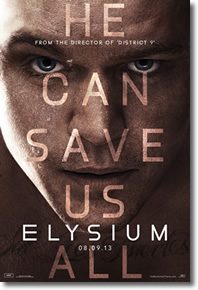 Update 10.Aug: I also wanna comment about Elysium .. which I saw opening night (last night). That commentary (for example) should go at the very end of the Big Brother entry.
Update 10.Aug: I also wanna comment about Elysium .. which I saw opening night (last night). That commentary (for example) should go at the very end of the Big Brother entry.
But I first want to take some time to think about it. The good movies linger on .. long after you exit the theater. (Try to find one with a killer sound system.)
I know this dude (Steve) who hails South Africa, Johannesburg .. or "Jozi" as he calls it. Tho we have never met in the flesh, he stays in touch every few months .. for nearly a decade now.
He sends photos of his exotic travel destinations. He does a lot of hiking and camping. And he always asks how the Bug is doing and sends best wishes.
I asked if he knew Blomkamp, the South African who wrote and directed Elysium, and who is also from Johannesburg. He does not, but says there's pretty much only one-degree-of-separation between (all) filmmakers in Jo-burg. (Steve is also in the business there.)
Already however, I find myself thinking more about the Jodie Foster character. Dude, does not Jodie Foster kick ass? She is nothing short of remarkable. Her whole career, really.
And dont think I didnt notice that the hero gets microwaved with a lethal dose of radiation. Too easy to relate to that. I was definitely squirming during that scene.
In commercial nuclear power, if you cook somebody, you're pretty much fired. (Truckmasters here I come.)
Wait 'til you see the exploding droid get hit with the triple-blaster gun. One of the coolest visual effects I have ever seen. Both my arms went straight up. And when he pulls the head off of the droid. That was nice. I was totally diggin' that.
Nobody is going to walk out of this movie and say, "Uh, I'm not sure if I got what was going on" (.. like with Syriana).
Anyway, that page is already too big (25-KB gzip-compressed HTML + 430-KB gfx) .. but that is the place where that commentary should go .. and I do not want to break that entry into 5 pages. If possible.
» Going for Broke .. with the Broke-Goers
I love watching the previews. The best one we saw was for a movie titled The Counselor, starring Brad Pitt + an all-star line-up.
Directed by Ridley. Everybody was saying, "Wow, that looks good." Strong .. is the word I would use. "Multiply by ten." (Official site. Coming in October.)
 Dude, Ridley's movies have helped define our very culture .. in powerful ways. "That's a baaaad man."
Dude, Ridley's movies have helped define our very culture .. in powerful ways. "That's a baaaad man."
And his younger brother Tony killed himself last year (Aug 19).
I do not know what that must feel like .. but, oh wait ..
It appears that Cormac has signed on .. for his first gig at non-adaptive screen writing. No wonder it looks so good. [ Cormac is like Elijah the prophet .. in that he » turns the hearts-of-the-fathers to the children. ]
Ridley's first movie after his brother? .. and bringing Cormac onboard? With an all-star cast? It would seem they are going for broke. No? Certainly they have assembled the talent.
[ achor link for blade runner appeal
I knew a guy (John) who owned a furniture store (and made his own distressed furniture) in Corona del Mar .. right there on PCH, where traffic slows to a crawl. He himself was very level-headed, but his Cuban wife was just the opposite.
Anyway, Blade Runner was his favorite movie. And he spent quite some time telling me why. Very interesting dialogue.
He had even purchased a high-quality disc, which we watched one Saturday nite .. sitting on his distressed sofa .. after a gourmet-ish dinner .. with a daiquiri that crept up on you.
It's based on the book by Phillip K Dick, a California dude who saw things most people don't. The book is titled » Do Androids Dream of Electric Sheep?
The movie makes you think, which is generally considered a good thing. (Blade Runner is another film directed by Ridley, a Brit.)
The folks at Rotten Tomatoes call Ridley a » "Legendary filmmaker". ]
I also saw the preview for the Monument Men (true story, Christmas release). "Dude, why would you do something like that? Why did you step on that land-mine?"
</update_10.aug>
» Proust's Memory & Closely Observing Aristocracy in Action
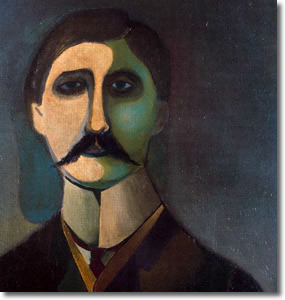 Yes, there is the muscular terseness of Hemingway » el macho, bull-fighter Hemingway ..
Yes, there is the muscular terseness of Hemingway » el macho, bull-fighter Hemingway ..
.. with his » short. declarative. sentences.
And then there is Proust .. with his 4-page sentences (356 words, one for nearly every day of the year).
[ Proust felt you could not end a sentence without completing the thought. He apparently had some big ideas. ]
Proust, who died in Paris in late-1922, was an early twentieth century contemporary of Hemingway, who arrived in Paris late in 1921.
So it is certainly possible that they both breathed the same molecule of Parisian air some time in 1922.
My old walk-in-the-park friend was born in '22, some six months before Proust died. So they shared a slice of time. Perhaps they even breathed the same molecule air, on the same day (.. tho, not likely).
The Sun Also Rises was published in '26. Hemingway probably worked on it in '25 .. so were talking only a few years after his death.
» Exploring Involuntary Memory & Why People Do Seemingly Crazy Shit
Proust is very much about » memory .. more specifically » involuntary memory, and especially its evocative power. (Cool stuff, for sure.)
Remembrance of Things Past was NOT the title he gave his own book. That was the title given by the translator, who took a line from one of Shakespeare's sonnets.
The original title that Proust himself gave his book translates (literally from the French) as » In Search of Lost Time (.. which still involves » memory).
Proust's explorations of involuntary memory make me think about what Isaiah said, quoting God » "I will remember no more...."
There are 4 or 5 translations that you should familiarize yourself with, the most recent by Lydia Davis coming in 2003 (Book 1 only, Swann's Way) which sounds to me the most interesting, tho the library carries only the original (more poetic and 'flowery') Scott Moncrieff translation.
{ Which makes me think of the King James translation of the Bible (1611), noted for its poetic beauty .. versus say, the New American Standard (1963-1971), which today (more than 400 years later) ..
.. is obviously a more accurate rendering ..
.. seeing that languages do indeed change over time .. and four centuries is a LOT of time.
Sometimes I even get off the porch myself and render a rad 21st Century, Digital Age translation.
But I only do that when I feel like I have a handle on the gist of (or the 'spirit' of?) the original verse.
They must continue to revise the NASB, because I notice little tweaks here-n-there. For example, my slim, burgundy hard-copy renders the word » 'certain' in this verse ..
.. rather than 'guaranteed' like you see here, which is the latest and greatest translation.
I noticed that quirk .. back when I wanted to play off that particular rendering of the term .. when I was discussing » uncertainty vs certainty in the context of quantum physics in this entry ..
.. which discusses reality .. or at least how different people might come away with different interpretations. But 'sure' doesnt quite do the thing I was trying to do.
After considering the various renderings, my take-away of that particular verse was » if God Himself guarantees something, you can consider it » certain. =) [ Which KJV renders » 'sure' .. which is surely the most poetic. ]
I once had a pastor (Sam) who announced one Sunday morning » "Next week, I'm going to start using the New American Standard translation."
So I own a copy and have come to prefer the more accurate rendering. But at the time, it was a fairly radical move for him to set aside the KJV. A few of the grannies even passed out and had to be revived.
"If the King James version was good enough for the Apostle Paul," they said, rather indignantly, after getting a whiff of the smelling salts, "then it ought to be good enough for Pastor Sam."
(There is even a Literal translation.)
This is why I feel I would prefer the Lydia Davis translation.
At the beginning of the Restored Edition of Moveable Feast, Ernest's son Patrick (now in his 80's) talks about different Biblical translations ..
.. as his entrée into discussing why they decided to release another version of the same book .. 35 years later.
You actually get to hear him speak Latin (in the audio book).
Whenever the subject of translations comes up, I am reminded what Pevear said in his translator's intro to Notes from Underground. (» It matters. Sometimes a lot.)
Seems to me that Pevear 'gets' more than (just) translations. }
In the intro to Le Rouge et Le Noir (cool title) I read that Stendhal's "seminal" » On Love was an influence on Proust's book.
This doesnt surprise me. No. Because Stendhal was a BIG observer of aristocracy in society .. back when subverting or ignoring such class distinctions could (and did) get you killed.
Like with Proust, today's entry is very much about » memory .. as you will see.
My brother once told me, "I remember pretty much everything I hear." He is a surgeon. No, he was not bragging.
I have a good memory, myself (.. tho sometimes, I try to forget certain things).
I never tried to have a good memory. So naturally, it feels like » a gift .. particularly in those areas where it seems to provide a benefit.
[ Tho dont get me wrong .. I *do* try to and even enjoy 'enhancing' (sometimes very much) mental (electro-chemical) processes. Subtle point. But worth noting. ]
Memories can seem like the gift that keeps on giving .. or they can seem like a curse that just wont quit.
Whatever author I am currently reading tends to color or influence my writing. Yes, I am writing about Hemingway, but I have been reading Proust.
Proust is very much about o.b.s.e.r.v.i.n.g behavior .. of aristocracy and bourgeoisie, and the "interpenetration" (sounds downright sexual) that occurred between the two social groups ..
.. between the years 1880 and WW1. [ Stendhal did the same thing back in 1830 ..
.. after Napoleon over-reached and got his ass handed to him by the Russians. Hitler made the same mistake. ] Proust then attempts to ascribe to this observed-behavior some "psychological law" .. that is reproducible.
In order to figure out odd behavior, you must observe closely. (There IS a reason why people do the crazy shit they do.)
» Reading Colors Writing | Assembling a World-Class Palette
I am not discussing Proust today, but he is an interesting character in many ways. Maybe another time. But, if you see a sentence here that runs on for 4 pages .. you can blame that on Proust.
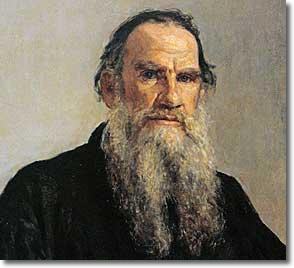 My point » the writer needs a variety (« see video clip at t=0:55 to t=1:13 ) of tools .. to best convey what it is he is trying to convey ..
My point » the writer needs a variety (« see video clip at t=0:55 to t=1:13 ) of tools .. to best convey what it is he is trying to convey ..
.. which is not far from what Tolstoy said about his penning of War and Peace (.. previously titled » The Year 1805) ..
.. which Hemingway calls "the best book I know" [ P 101 of Phillips' book ].
Sometimes I may simply need to say » I had my tooth pulled yesterday.
Other times, however, I may feel the need to proclaim » The dentist grabbed hold of my aching tooth with the rusty pliers. Gradually he pressed his army boot harder against my forehead until he finally shouted, "Ah, shut up, you big baby!"
» Salinger Speaks | Whoa 'Berto
Since the movie is soon to be released, this might be a good place to note that Hemingway met with JD Salinger [ Catcher in the Rye ] ..
.. who was 20 years younger than Hemingway, during WW II, and each man appreciated the other.
Salinger lists as some of his literary influences » Kafka, Tolstoy, Chekhov, Dostoevsky, Proust, Rilke, Fitzgerald. Salinger saw himself, some say, as Fitzgerald 2.0.
In keeping with the tenets of web site optimization, today's entry has been broken into FOUR PAGES. The next page is posted here » Not Talking About Writing - Part 2/4.
Intentional Moveable Type Spacer
